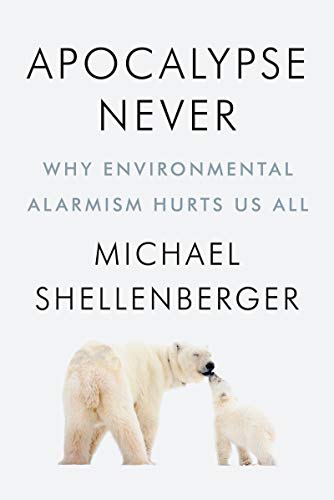10 Best-Selling Environmentalism Books Millions Love
Discover top Environmentalism books recommended by Bill Gates, Leonardo DiCaprio, and Jacquelyn Gill, blending expert insight with reader acclaim.







There's something special about books that both critics and crowds love, especially when it comes to environmentalism — a subject more urgent now than ever. These 10 best-selling Environmentalism books have resonated widely because they tackle the complex challenges of our planet with proven insights and accessible narratives. Whether it’s climate activism, biodiversity loss, or social justice, these works offer frameworks validated by both experts and readers alike.
Experts like Bill Gates, co-founder of Microsoft and philanthropist, lend their endorsement to books such as The Sixth Extinction, emphasizing the importance of understanding humanity’s impact on biodiversity. Actor and environmentalist advocate Leonardo DiCaprio backs The Last Hours of Ancient Sunlight, highlighting the intersection of political activism and ecological urgency. Meanwhile, climate analyst David Roberts praises Drawdown for its practical, actionable approach to reversing global warming. These recommendations reflect a blend of authoritative voices shaping the discourse.
While these popular books provide proven frameworks and perspectives, you might want to explore content tailored to your unique Environmentalism interests. Consider creating a personalized Environmentalism book that combines these validated approaches with insights specific to your background and goals. This way, you engage deeply with the topics that matter most to you, supported by expert-endorsed knowledge.
by Rachel Carson··You?
by Rachel Carson··You?
When Rachel Carson wrote Silent Spring, she challenged the prevailing faith in chemical pesticides, revealing their damaging effects on ecosystems and human health. Drawing on her marine biology background and deep scientific research, she details the consequences of widespread DDT use, sparking awareness about environmental contamination. You’ll gain insights into the interplay between human actions and natural systems, understanding how policies and public perception shifted due to this work. This book suits anyone interested in environmental policy, science communication, or the origins of the modern environmental movement, offering a sobering look at the costs of unchecked industrial progress.
Recommended by Leonardo DiCaprio
Actor and environmentalist advocate
by Thom Hartmann, Neale Donald Walsch·You?
by Thom Hartmann, Neale Donald Walsch·You?
What started as a response to escalating environmental crises became a thorough examination of humanity's impact on Earth. Thom Hartmann, drawing from decades of activism and collaboration with thought leaders like Neale Donald Walsch, unpacks the complex causes behind climate change, resource depletion, and cultural inertia. You’ll gain insight into how political decisions and corporate influences intertwine with ecological decline, alongside discussions on actionable political activism. Chapters delve into topics like energy dependence, ecosystem collapse, and social change, making this a book for those ready to understand and engage with environmental challenges beyond surface-level awareness.
by TailoredRead AI·
This personalized book explores practical, evidence-based approaches to addressing climate change, tailored to your specific concerns and background. It combines widely validated knowledge with insights aligned to your unique interests, allowing you to focus on the climate topics and solutions that matter most to you. The book examines various mitigation and adaptation strategies, reviews the science behind climate action, and highlights scalable efforts to reduce environmental impact. By centering on your goals and skill level, this tailored resource provides a focused and engaging path through the complex challenges of climate change, making the journey toward meaningful action accessible and relevant.
Recommended by Nahid Bhadelia
Infectious diseases MD, research director
“I loved Project Hail Mary. Also recently started Klara and The Sun. I am a big fan of Sixth Extinction (a must read book on human impact on our planet) so Under A White Sky is on the reading list.” (from X)
by Elizabeth Kolbert··You?
by Elizabeth Kolbert··You?
Elizabeth Kolbert, a seasoned New Yorker staff writer, explores the unfolding mass extinction caused by human activity, blending thorough field research with historical context. You get to follow scientists studying endangered species like the Panamanian golden frog and staghorn coral, gaining insight into the ecological shifts reshaping our planet. The book challenges you to reconsider humanity's role in nature, weaving in chapters on extinction's scientific origins and current environmental crises. If you're curious about biodiversity loss and want a grounded, narrative-driven examination of environmental change, this book offers a thoughtful and sobering perspective.
Recommended by The New Yorker
“Gripping . . . Brannen excels at evoking lost worlds.” (from Amazon)
by Peter Brannen··You?
Peter Brannen’s background as a contributing writer at The Atlantic and his extensive experience reporting on Earth’s history led him to craft a narrative that connects the planet’s five mass extinctions to current climate challenges. You’ll gain a detailed understanding of how volcanic eruptions, toxic oceans, and asteroid impacts shaped life’s trajectory, supported by vivid examples like dragonflies the size of seagulls and ancient fish species. This book suits anyone interested in environmental change through a geological lens, especially those curious about how past catastrophes inform our uncertain future. Chapters exploring fossil evidence and interviews with scientists on the front lines provide concrete insights into Earth’s resilience and fragility.
Recommended by David Roberts
Energy politics blogger and climate analyst
“There’s been no real way for ordinary people to get an understanding of what they can do and what impact it can have. There remains no single, comprehensive, reliable compendium of carbon-reduction solutions across sectors. At least until now. . . . The public is hungry for this kind of practical wisdom.” (from Amazon)
Paul Hawken challenges the notion that combating climate change is beyond our reach by assembling a meticulously researched collection of 100 actionable solutions spanning energy, agriculture, education, and land use. You'll explore diverse strategies like educating girls to reduce carbon footprints and innovative land management practices that draw down atmospheric greenhouse gases. This book offers a realistic framework for understanding what communities worldwide can implement now, emphasizing both environmental and social benefits. If you seek a grounded plan to engage with climate action across sectors, this work lays out the evidence and possibilities without sugarcoating the complexity.
by TailoredRead AI·
by TailoredRead AI·
This tailored book explores practical, step-by-step actions to quickly reduce your ecological footprint, focusing on approaches that align with your interests and lifestyle. It covers key areas such as sustainable living habits, energy conservation, waste reduction, and eco-friendly consumption, all tailored to match your background and specific goals. By examining widely validated environmental practices through a personalized lens, it encourages meaningful, measurable change in just 90 days. The book reveals how individual choices connect to broader ecological impacts, empowering you to engage deeply with the topic. This personalized guide makes complex environmental concepts accessible and relevant, helping you make an immediate difference.
Recommended by Colin Wright
Evolutionary biologist, Managing Editor at Quillette
“@xavierbonilla87 Interesting piece in @Quillette by @LKrauss1 about this book.” (from X)
by Steven E. Koonin··You?
by Steven E. Koonin··You?
Steven E. Koonin, with decades of experience in physics and science policy, challenges prevailing narratives about climate change by dissecting what the science truly reveals and what remains uncertain. You’ll explore how climate models struggle to replicate past climates, why global temperature trends defy simple explanations, and what implications this has for future predictions. The book also scrutinizes common assumptions about environmental threats and societal responses, offering a data-driven perspective on adaptation and geoengineering. If you want a grounded, nuanced understanding of climate science beyond headlines, this book offers insights that sharpen your ability to evaluate ongoing environmental debates.
Recommended by Simon Kuestenmacher
German geographer and demographer
“This is a view of Chimborazo in 1810 as recorded by the greatest geographer in history (bold claim, I know...) Alexander von Humboldt. I love reading about his life. Must read book on Humboldt:” (from X)
by Andrea Wulf··You?
by Andrea Wulf··You?
Andrea Wulf draws you into the world of Alexander von Humboldt, whose groundbreaking vision redefined how we understand nature as a complex, interconnected force rather than a mere resource. You’ll explore Humboldt’s daring expeditions, from climbing volcanoes to traversing Siberia, and discover his early warnings about climate change alongside his poetic scientific observations. The book reveals how his ideas influenced figures like Darwin and Thoreau, giving you insight into the roots of modern environmentalism. If you’re fascinated by natural history and want a richly detailed narrative that connects exploration with environmental thought, this book offers a rewarding journey.
Recommended by Maxime Bernier
Leader of the People's Party of Canada
“MUST READ - because the lying mainstream media won’t mention it. Veteran environmentalist apologizes in new book for unfounded climate change alarmism.” (from X)
by Michael Shellenberger··You?
by Michael Shellenberger··You?
When Michael Shellenberger first confronted the often alarmist narratives dominating environmental discourse, he drew on decades of activism and energy expertise to offer a more measured perspective. You’ll find clear distinctions between genuine environmental challenges and exaggerated fears, backed by data like the decline in extreme weather deaths and carbon emissions trends. Chapters explore topics such as nuclear energy’s role and the psychological drivers behind apocalypse-focused thinking, equipping you to critically assess environmental claims. This book suits those who want evidence-based insight rather than fear-driven rhetoric, especially if you’re seeking a nuanced understanding of climate and energy issues.
by Douglas W. Tallamy, Rick Darke··You?
by Douglas W. Tallamy, Rick Darke··You?
When Douglas W. Tallamy first recognized how deeply native plants underpin local ecosystems, he set out to reveal an overlooked truth: alien plants disrupt the food chain by starving native insects, which then impacts birds and other wildlife. This book guides you through understanding those ecological connections and how your garden choices can help reverse habitat loss. Tallamy offers clear examples, like the dependency of caterpillars on native oaks, demonstrating why planting local species matters. If you're passionate about wildlife preservation or gardening with purpose, this book equips you with the ecological knowledge to make a meaningful difference in your own backyard.
by Leah Thomas·You?
Leah Thomas, the activist who coined the term "Intersectional Environmentalism," explores the deep connections between environmental issues and social justice in this insightful book. She challenges you to see how environmentalism cannot succeed without addressing systemic racism and privilege, offering a fresh perspective on activism that includes marginalized voices. Chapters delve into how Black, Indigenous, and people of color face disproportionate environmental harms, making a case that fighting for civil rights and the planet are inseparable causes. This book suits anyone eager to understand how social factors intersect with environmental challenges and who wants to engage in activism that uplifts all communities equally.
Proven Environmentalism Strategies, Personalized ✨
Get popular methods that fit your unique environmental goals and challenges.
Validated by 10 expert endorsements and thousands of readers
Conclusion
These 10 Environmentalism books collectively emphasize the importance of understanding our planet's challenges through diverse lenses — from scientific research and historical context to practical solutions and social justice. If you prefer proven methods rooted in science and activism, starting with Drawdown and The Last Hours of Ancient Sunlight offers a solid foundation. For validated approaches that challenge common narratives and deepen your understanding, Unsettled and Apocalypse Never provide nuanced perspectives.
Combining these books can broaden your grasp of environmental issues, from the roots of ecological change to the latest strategies for meaningful action. Alternatively, you can create a personalized Environmentalism book to merge proven methods with your unique interests and circumstances.
These widely adopted approaches have helped many readers succeed in navigating the complexities of environmentalism, equipping you to make informed decisions and contribute thoughtfully to the conversation about our planet’s future.
Frequently Asked Questions
I'm overwhelmed by choice – which book should I start with?
Start with Drawdown for an accessible, practical overview of climate solutions backed by expert endorsements. It offers clear actions you can relate to, making it a great entry point.
Are these books too advanced for someone new to Environmentalism?
No, many books like Silent Spring and Bringing Nature Home provide foundational knowledge suitable for beginners while still engaging experienced readers.
What's the best order to read these books?
Begin with broad overviews like The Last Hours of Ancient Sunlight and The Sixth Extinction, then explore specialized topics such as climate science in Unsettled or social justice in The Intersectional Environmentalist.
Should I start with the newest book or a classic?
Both offer value. Classics like Silent Spring shaped the environmental movement’s roots, while newer works like The Intersectional Environmentalist address current challenges and perspectives.
Do I really need to read all of these, or can I just pick one?
You can pick based on your interests, but reading several offers a richer understanding. Each book covers unique angles, from science to activism to policy.
How can I get tailored insights if these books don't fit my specific needs?
These expert books are invaluable, but personalized content can complement them by focusing on your unique goals. You might consider creating a personalized Environmentalism book to combine proven knowledge with your specific context.
📚 Love this book list?
Help fellow book lovers discover great books, share this curated list with others!
Related Articles You May Like
Explore more curated book recommendations









